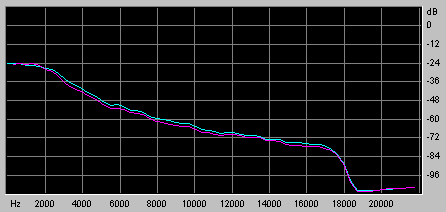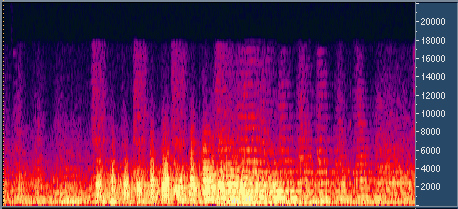Another AAC encoder currently available is Astrid's
Quartex encoder. Decoding for testing was done with the provided
Quartex decoder.

Quartex NTT Based 128kb/s Frequency Response

Quartex NTT Based 128kb/s Spectral View
When encoding at 128kb/s Quartex faithfully reproduces
the frequency response of the source material up to 17kHz but sharply
suppresses everything above 18kHz.
The spectral view shows that all the detail of the
source material is present up to 17kHz but that everything above
18kHz is gone. It would seem that this encoder eliminates the shortcomings
of NTT's 96kb/s VQF files for all content below 18kHz at the expense
of suppressing content above this point.
Listening tests are very favorable of this encoder. On most material
I can hear no difference between 128kb/s Quartex encoded files and
the original source material. With headphone listening I can not
hear any obvious problems with the stereo imaging like I found in
the 96kb/s VQF files. Some serious listening on a good pair of speakers
will be needed to determine if there is any degradation to the stereo
image.
Another pleasant surprise was the low overhead needed to play
back the file. CPU utilization was only 25% on my system which is
on par with the resources needed to play 256kb/s MP3 files.
There are a couple of problems with the format though. Even though
the encoder produces files with an .AAC extension none of the current
AAC players can play the file. The only player I have at the moment
that can play these files is K-Jofol. Unfortunately encoding is
very slow but this is not so important as the codec supports an
"idle" switch so you can work on you PC while encoding
and only idle CPU cycles will be used for encoding.
In my opinion if this codec was enhanced to allow encoding files
at 160kb/s it would be a clear cut winner. As it is I am seriously
considering it for all my encoding needs in its current 128kb/s
format.
[Back] [Next]